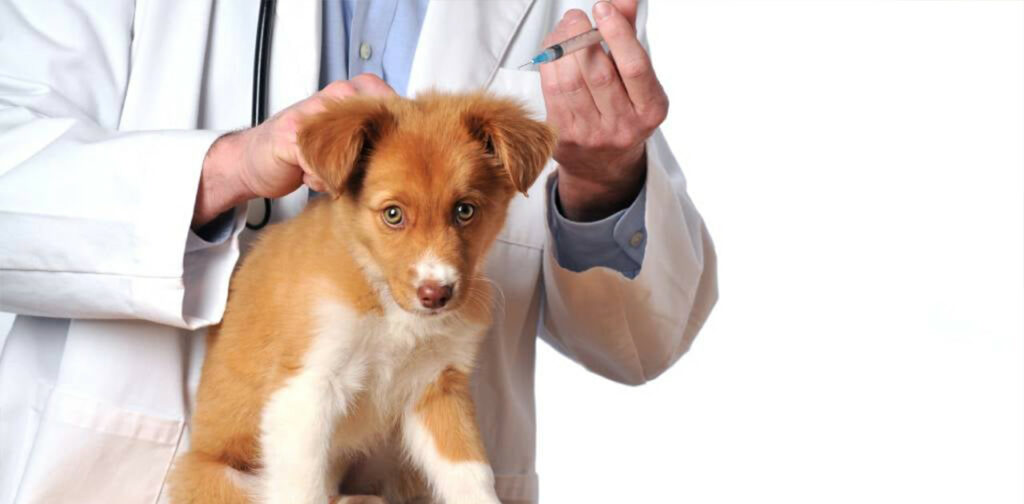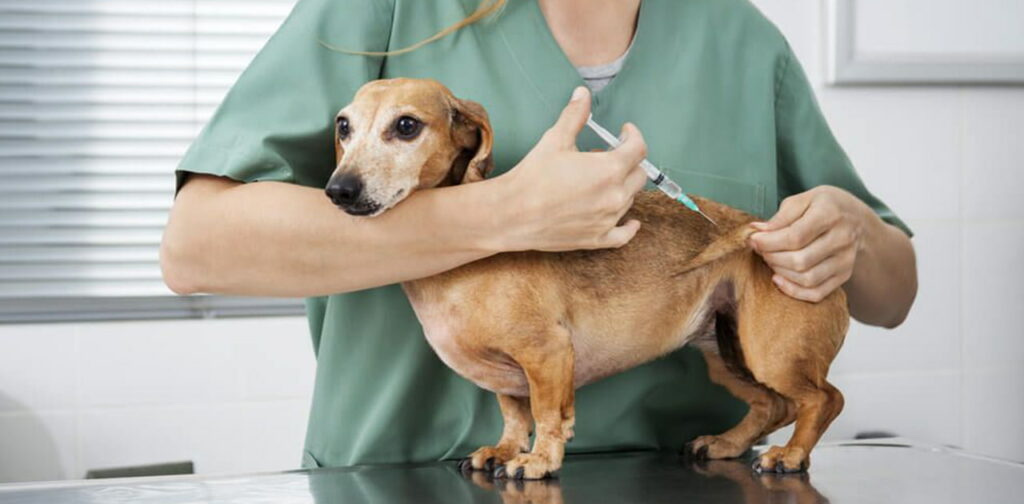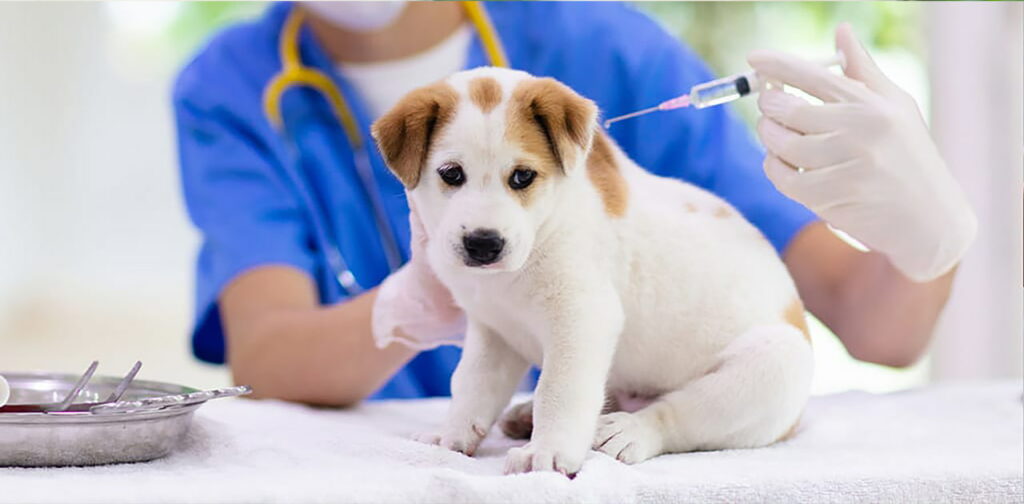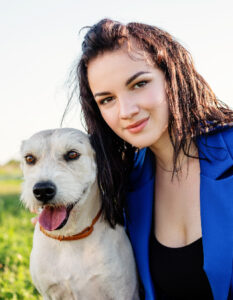Canine Parvovirus is one of the deadliest viruses out there. Puppies are the most at risk of getting infected and severely suffer through the infection of this virus. OInfected puppies can die within a day if not treated timely.
As a veterinarian Pavo is one of the most common viruses that I see in my little puppy patients. Parvo virus affects un vaccinated young puppies of the age of 6 weeks to 6 months. The virus can both infect and injure your puppy.
Therefore, it is extremely important to know, what is Canine Parvovirus, why puppies get infected, what are the symptoms and how many parvo shots does a puppy need.
Table of Contents
ToggleWhat is Parvo and How does it spread?

Parvo is a highly communicable virus often attacking puppies and dogs both. Parvo virus can cause your puppy severe gastrointestinal problems. Infected puppies are at high risk of death if not treated immediately.
This virus is highly contiguous and can spread through contact with the virus.
Your puppy can get exposed to the virus through,
- Contact with infected feces
- Contaminated environments
- Contact with contaminated objects
- Transmission from infected dogs
- Maternal transmission from infected mother to puppies during pregnancy or nursing
Why Do Puppies Get Parvo?
Puppies are more prone to parvo virus and its severity in comparison to dogs. Our little puppies are still developing their immune system and as a puppy have a considerably weakened immune system. This weakness makes them much more vulnerable in comparison to adult dogs.
Their immune system can not fight the virus effectively as a result the infection may end up deadly. Also as puppies are at the early stage of their lives they are mostly not well trained to behave properly.
Due to this lack of training puppies often roam around in dirty places and exhibit signs of excessive licking or chewing random objects. Thes dirty areas and random objects may be contaminated by other dogs. This can cause puppies to be exposed and affected by the virus.
It is extremely important to understand the nature, symptoms and how many parvo shots does a puppy need for ensuring optimal health of your puppy.
5 key factors that contribute to the higher risk of infection are,
- Insufficient vaccination
- Exposure to contaminated feces
- Crowded living conditions
- Lack of proper hygiene practices
- Close contact with infected dogs

Signs and Symptoms of Parvo
As a vet I have seen many puppy owners making the mistake of bringing their beloved puppies late for veterinary attention. I myself have encountered a few deaths due to untimely medical attention to the puppies.
Therefore, I have created a list of signs and symptoms to help you with identifying potential risks of Parvo in your beloved puppy. In case of suspicion bring your puppy to veterinary care within the hour to avoid fatality.
Severe vomiting
If you find your little puppy vomiting excessively, it is time to be alarmed. You may notice persistent vomiting in them. You may also notice loss of blood and dehydration with vomiting.
Bloody diarrhoea
Whereas puppy diarerhea is a common health issue in puppies, when it comes to Parvo, your puppy will have severe diarrerhea accompanied by blood loss.
Fever
Watch out for high fever in your puppy. This may indicate the puppy’s body response to the viral infection of Parvo.
Abdominal pain
Your puppy may encounter severe abdominal pain due to the infection. This can cause discomfort and tenderness around the abdomen area with difficulty to move or eat.
Watch for signs like restlessness, panting, hunching, or sensitivity when touching the abdomen to detect abdominal pain.
Loss of appetite
Notice if your puppy is not eating as much as before. Lack of appetite always suggests some sort of health issues in puppies. You can observe your puppy’s eating pattern and ask yourself, if your puppy is eating as frequently as before, if your puppy is eating as much as before, is your puppy avoiding feeding time.
Dehydration
With a lack of appetite your puppy may also refuse to drink enough water. Puppies need a lot of hydration. Due to all that vomiting, diarrhea and refusal to drink water can cause dehydration.
Weight loss
You may see sudden weight loss in your puppy. In infected puppies it is often visible in clear eyes. However, if you suspect infection you can weigh them and compare with their regular weight.
Lethargy and Weakness
Observe if your puppy is acting sluggish and lacks energy. They might also have difficulty in standing or walking.
How Do Veterinarians Diagnose Parvo?
It is important to take your little friend to the vet as soon as you notice signs of infection for early detection, assessment of severity and treatment planning. Getting into veterinary care without any idea of how they will treat your puppy can be overwhelming.
Allow me to explain how we veterinarians ensure the proper diagnosis of your beloved puppy.
At first your puppy will go through a physical examination, then we will ask for their medical history and evaluate it. Then we will move on to some tests to determine your pup’s current health.
- Fecal Antigen Test (ELISA): Quickly detects Parvovirus antigens in feces, aiding prompt diagnosis.
- PCR Test: Highly sensitive and specific for Parvovirus DNA, providing accurate results swiftly.
- Blood Tests (CBC and serum biochemistry profile): Assess overall health, monitor complications, and guide treatment.
- Virus Isolation: Cultivates virus from feces, confirming active infection and aiding in strain identification.
- Serology: Detects antibodies in blood, useful for assessing immunity and vaccination status.
These diagnostic methods are essential for accurately diagnosing Parvovirus infection in puppy’s and guiding appropriate treatment and management strategies.

How Many Parvo Shots Does a Puppy Need?
Prevention is always more favorable than cure, especially when it comes to health and wellbeing. Vaccination of your puppy ensures strong immunity, disease prevention, reduced transmission, saves money that you may need to spend on treatment in future and offers peace of mind.
The answer to how many parvo shots does a puppy need is, your puppy may need 2 to 4 shots, depending on the specific vaccination protocol of the clinic or the state. Let’s discuss the vaccination process and recommended vaccination schedule for parvo shots to understand it a little better.
Vaccination Process
The vaccination for Parvovirus comes in a series of shots. This helps to strengthen your little friend’s immune system.
- Primary Vaccination Series: When your puppy is 6-8 weeks old consult your vet for primary vaccination. This is to strengthen the puppy’s immune system against various infectious diseases, including Parvovirus.
- Booster Vaccination: After primary vaccination take your puppy for booster vaccination. Booster vaccination will strengthen long-term protection against diseases like Parvovirus.
Recommended Vaccination Schedule For Parvo Shots
You must follow the vaccination schedule to ensure your puppy is safe during their vulnerable early months.
- First Vaccination: Typically administered at 6-8 weeks of age, the first Parvovirus vaccination primes the puppy’s immune system.
- Booster Shots: Puppies typically receive booster vaccinations every 3-4 weeks until they are around 16 weeks old.
- Additional Boosters: Depending on your puppy’s unique needs they may need additional booster shots till the age of 3 years old.
Conclusion
Unvaccinated puppies can easily come in contact with Canine Parvovirus. Their weak and developing immune system is not well equipped to fight with the virus.
Therefore, it is important to give their immune system a boost with proper vaccination. Canine Parvovirus can be fatal for puppies, so do not take chances with the health of your precious little furry friend.
Check out our website for more info to become an educated puppy parent.





